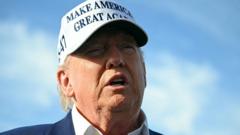Following President Trump's stark comments calling Putin "absolutely crazy" amid intensified Russian drone attacks on Ukraine, the Kremlin described his remarks as stemming from "emotional overload." As the conflict escalates, allies including Germany are reassessing military support strategies for Ukraine.
Kremlin Reacts to Trump's 'Crazy' Remarks on Putin Amid Escalating Drone Attacks

Kremlin Reacts to Trump's 'Crazy' Remarks on Putin Amid Escalating Drone Attacks
Trump's criticism of Putin prompts Kremlin's response, showcasing the increasing tensions surrounding the conflict in Ukraine as allies reevaluate their military support.
In a dramatic turn of events, the Kremlin weighed in on comments made by former President Donald Trump, labeling him as exhibiting signs of "emotional overload" after he referred to Russian President Vladimir Putin as "absolutely crazy." This remark followed Moscow's latest and most significant air assault on Ukraine, which involved a staggering 367 drones and missiles, leading to the deaths of 13 people over a single weekend. Trump expressed his outrage on Truth Social, suggesting that "something has happened" to Putin, criticizing the needless loss of life due to these attacks.
Dmitry Peskov, spokesperson for Putin, tied Trump's statements to the heightened emotions surrounding the ongoing conflict, while German Chancellor Friedrich Merz signaled a shift in the supply of arms to Ukraine, noting that there would no longer be limitations on range for the military support provided to Kyiv. The escalation in Russia's military activity marks the largest aerial assault since the invasion began in February 2022, further exacerbating the situation on the ground.
Amidst this, Ukraine's President Volodymyr Zelensky asserted that the Russian aerial attacks lacked military rationale, framing them as a political maneuver by Putin to prolong the conflict and further endanger lives. In response to these developments, Merz indicated a readiness to provide Ukraine with more capable weaponry, suggesting that the removal of range limits would empower Ukraine to defend itself against specified targets within Russia.
Meanwhile, Trump, reflecting on his relationship with Putin, expressed his concerns over his actions, reiterating his sentiment that such aggression could lead to Russia's downfall. Intriguingly, he also criticized Zelensky's handling of rhetoric, advising that it could be detrimental to Ukraine’s position in the conflict.
Despite ongoing preparations among European allies for additional sanctions against Russia, the U.S. remains in a complex position, contemplating whether to pursue peace talks or detach from negotiations altogether should progress falter. Peskov expressed gratitude towards Trump for his role in facilitating dialogue, following a lengthy phone call between the two leaders that aimed to discuss a ceasefire.
While Ukraine publicly endorsed a 30-day ceasefire, responses from the Kremlin suggested a cautious approach, as they only indicated a willingness to work toward a "memorandum" concerning future peace, which has received skepticism from Kyiv and its allies as potential stalling tactics.
As the tensions rise and repercussions escalate, the fate of Ukraine and the course of international military support hang delicately in the balance with each provocative statement and strategic military decision.






















